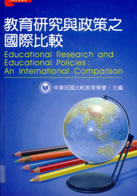| Zhong-hua min guo bi jiao jiao yu xue hui (1999). Jiao yu yan jiu yu zheng ce zhi guo ji bi jiao (Educational research and educational policies: an international comparison). Tai-bei: Yang zhi wen hua shi ye gu fen you xian gong si | |
|
|
An overview of the book (625 English words): This book aims to explore complexities and tensions between educational research and educational policies in comparative and international perspectives. Different socio-cultural and socio-economic factors may implement different educational policies at district and national levels, hinging upon power distribution among various government departments or policy-making bodies and relationships between epistemological and ideological aspects of educational research. This is an anthology, composed of thirteen articles written by Taiwanese educational educators, practitioners, theorists and research students, specified in educational policy, comparative education methodology, vocation education, financing and policy-making of higher education, community college, school-based management, educational reforms, Russia education, teacher education and China education. Such multi-faceted discussion hopes to help Taiwanese government to understand those issues when launching recent educational reforms. Weng Fwu-yuan, the first author, analyses the relationships between educational research and educational policy and discusses results of implementing educational research results on educational policy-making. With suggestions on how to build right relationships, the author pinpoints that politics greatly determine the relationships and possible changes. Since educational policy can reflect some assumptions, values and beliefs systems embedded in societal culture, it is necessary to make cross-cultural comparisons. The second author, Wang Nai-ying, argues that in educational policy analysis, a descriptive and predictive approach may threaten the credibility of understanding whereas an interpretative and explanatory approach may enhance such credibility and to solve related policy problems. Based on two academic giants’ methodological frameworks in comparative education (Brian Holmes’ ‘problem-solving approach’ and Edmund J. King’s ‘social ecological contextualism’) , the third author, Chang Shu-kang, tries to scrutinize the formation and implementation of education priority areas (EPA) between Taiwan and England with some suggestions on improving EPA in Taiwan. The fourth author, Chen Jin-ying, adopts Brian Holmes’ ‘problem-solving approach’ to investigate the concepts, functioning, historical development, philosophical foundations, curriculum content and organizational structure of community colleagues in USA and thereby draws some insights in Taiwanese case. The fifth author, Chiou Jaw-woei, brings out major acts and articulates eight trends of vocational-technical education in USA during 1990s through documentary analysis. Comparing revenue and expenditure of higher education in Taiwan, Japan, USA, UK, France and German with variations in student population and public educational fund, the sixth author Ting Chih-chyuan tries to make recommendations for future financing of higher education in Taiwan. The seventh author, Huang Chia-hsiung, endeavors to find out and explain those similarities and differences of school-based management policies in England and New Zealand by studying its tradition, determining factors and policies and socio-ideological contexts. The eighth author, Tai Hsiou-Hsia, reviews the birth of California Master Plan, its influence on development of the state’s higher education and examines challenging aspects against it. The ninth author pinpoints that throughout successive stages of British educational history (ranging from the 1862 Revised Code, via the 1870 Act, 1902 Act, 1944 Act to the 1988 Act), education has been constrained by socio-policial and socio-economic powers. Chung Yi-hsing, the tenth author, explores the potential development of a new official educational research institution in Taiwan by examining its counterpart named Russian Academy of Education in cross-national perspective. In Taiwan, there is a new policy in teacher education of reducing the practicum time for prospect teachers and forcing it into college students? regular courses. According to some international comparative studies and empirical research results, the eleventh author tries to examine the rationality of this new policy and finally refutes such policy revision with cross-national and local evidences. The twelfth and thirteenth authors in the same article compare vocational education teachers?employment situations in Taiwan and Mainland China, by examining their current educational laws and regulations governing the qualifications and process of teacher employment and screening. The last author categories five historical stages of Mainland China’s educational policies for regulating the movement of her overseas Chinese students from 1950s to 1990s with explorations of causative socio-economic, -ideological and -political factors. |
-
Recent News
Archives




